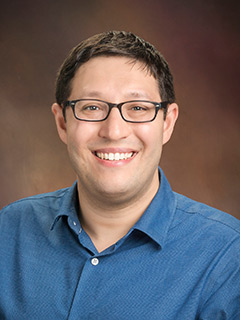HOW CAN WE HELP YOU? Call 1-800-TRY-CHOP
In This Section
Exceptional Scientists Honored, ADHD and Autism, Molecular Basis of Food Antigens

Children's Hospital of Philadelphia researchers receive early-career and outstanding science awards for contributions to their respective fields, and investigators reveal the molecular cause of an allergic trigger for eosinophilic esophagitis. In other research news, a Center for Autism Research study emphasize the importance of effective treatment of autistic adults' co-occurring ADHD, and PolicyLab investigators identify challenges pediatricians face when discussing safe navigation of police interactions with Black youth and their caregivers.
ASCI Recognizes Early-Career CHOP Researchers
The American Society for Clinical Investigation (ASCI) named two up-and-coming CHOP investigators among its 2025 Early-Career Awardees: Eugene Khandros, MD, PhD, and Sesh Sundararaman, MD, PhD. The ASCI is dedicated to the advancement of research that extends understanding of diseases and improves treatment, and its members are committed to mentoring future generations of scientists.

Eugene Khandros, MD, PhD
Dr. Eugene Khandros, an Attending Physician and Investigator in the Division of Hematology received a Young Physician-Scientist Award. As one of 50 recipients, the award recognizes scientists who are early in their first faculty appointment and have made notable achievements in their research.
Dr. Khandros studies epigenetic mechanisms regulating red blood cell gene expression and hemoglobin synthesis, with the goal of developing new therapeutic approaches for red blood cell disorders such as thalassemia and sickle cell disease.
"I have had the privilege of being mentored by many ASCI members throughout my training, and it is a great honor to have their support early in my independent career," Dr. Khandros said.

Sesh Sundararaman, MD, PhD
Dr. Sesh Sundararaman is one of 26 recipients of the Emerging-Generation Award, which recognizes post-MD, pre-faculty appointment scientists who are meaningfully engaged in immersive research.
As an Attending Physician and Investigator in the Division of Infectious Diseases, Dr. Sundararaman's research aims to understand how malaria parasites, which live in human red blood cells, rely on these cells for survival. This knowledge could help identify new ways to combat this deadly disease.
"I am honored to receive an ASCI E-Gen award, which is a testament to the excellent mentorship and support that I have received throughout my training at CHOP and Penn," Dr. Sundararaman said. "The E-Gen provides access to a plethora of resources to continue my development as a physician-scientist, as well as the opportunity to learn from researchers across the ASCI community."
Learn more and see all the awardees in the ASCI press release.
Society of Pediatric Research Honors Exceptional Scientists
The Society of Pediatric Research (SPR) announced two CHOP investigators will be honored for their exceptional scientific research contributions.

Amanda Muir, MD, MTR
SPR honored Amanda Muir, MD, MTR, with its New Member Outstanding Science Award. The award recognizes new members who have contributed to high-quality scientific research and who continue to demonstrate meaningful contributions in the pediatric academic field.
Dr. Muir aims to improve the lives of children with eosinophilic gastrointestinal disease and prevent the consequences of eosinophilic inflammation, including weight loss feeding disorders, dysphagia, and esophageal stricture. An attending physician in the Division of Gastroenterology, Hepatology, and Nutrition, Dr. Muir has expertise in esophageal epithelial biology and 3-D culture systems. She developed an esophageal organoid platform to recapitulate the eosinophilic esophagitis (EoE) microenvironment and used this model to understand the role of the esophageal epithelium in propagating inflammation and fibrosis.

Daniel Corwin, MD, MSCE
Daniel Corwin, MD, MSCE, received the Young Investigator Award, which recognizes a rising star with outstanding scientific research accomplishments that help to unravel the mysteries of childhood development or disease. He will present as the awardee at the PAS 2025 meeting during the SPR Presidential Plenary: Best of SPR Featured Science.
Dr. Corwin's research aims to improve the diagnosis of mild traumatic brain injury (TBI) using objective physiologic markers of injury and the risk stratification for mild TBI in pediatric patients evaluated shortly after an injury to guide referral and intervention strategies. Dr. Corwin is the Director of Research Operations in the Division of Emergency Medicine at CHOP and Emergency Department Lead for the Minds Matter Concussion Program.
Visit the SPR Awards page to learn more.
Treating ADHD in Autistic Adults May Improve Overall Health Outcomes

Benjamin Yerys, PhD
Researchers from CHOP, Drexel University, and George Washington University suggested that attention-deficit/hyperactivity disorder (ADHD) rates among autistic adults were nearly identical to ADHD rates seen in autistic children. They called for Medicaid system changes to support the growing group of autistic adults with co-occurring ADHD to ensure access to care coordination, medication, and specialty care.
"As rates of autism continue to rise in childhood, at a clinical level, we need to make sure that an increased number of patients with co-occurring ADHD in adulthood have access to support programs that provide autism as well asADHD services across the lifespan of these patients," said lead study author Benjamin Yerys, PhD, a Psychologist in the Department of Child and Adolescent Psychiatry and Behavioral Sciences and Director of the PASSAGE program in the Center for Autism Research at CHOP.
Studying a cohort of more than 3.5 million Medicaid-enrolled adults, the researchers wanted to understand the prevalence of ADHD in adult patients with autism as well as the effects of managing ADHD with medication to help inform clinical care for these adults. They found that autistic adults experienced high rates of co-occurring ADHD and were more likely to receive prescriptions for ADHD medications than adults in the general Medicaid-enrolled population. The researchers noted that is the first study they know of to show that co-occurring ADHD is associated with higher rates of cardiovascular conditions, injury, and substance use among autistic adults; those who received medications for ADHD had better outcomes.
JAMA Network Open published the findings. Read more in this CHOP news release.
CHOP Researchers Identify Molecular Cause for Milk Allergen Trigger in EoE

David Hill, MD, PhD
A CHOP-led, multi-institutional study is the first to identify one of the allergens responsible for eosinophilic esophagitis (EoE), an inflammatory disease of the esophagus affecting approximately 1 in every 2,000 children. The research team is also the first to describe molecular details of food antigen recognition in EoE.
"If we understand what's happening at a molecular level, it could allow us to develop better, more accurate diagnostic tests to find out which foods trigger this disease and ultimately reduce the morbidity associated with EoE," said senior study author David Hill, MD, PhD, an Attending Physician with the Division of Allergy and Immunology.
Researchers used a variety of sequencing methods, including single cell RNA sequencing, T-cell receptor sequencing, and tetramer-based diagnostics, typically used for certain types of cancer. Tetramer-based diagnostics utilize four major histocompatibility complex molecules, found on the surface of most cells in the body, to identify antigen-specific T cells, which then helps identify the antigens that trigger that T cell immune response.
Researchers identified a patient with EoE whose allergic trigger is milk and used their sequencing methods at a single cell level to pinpoint the specific milk protein — in this case, β-casein AA 59-78 — that caused this patient's case of EoE.
"While this study focused on one patient with EoE, we believe our understanding of the molecular basis of food antigens will have much larger implications, and we're looking to expand this research into other foods that may trigger allergic responses" Dr. Hill said.
The Journal of Allergy and Clinical Immunology published the novel findings. Learn more in this CHOP news release.
Pediatricians' Role in Preparing Black Youth for Potential Police Encounters

George Dalembert, MD, MSHP
CHOP researchers evaluated pediatricians' perspectives to understand barriers and facilitators to discussing how to safely navigate police interactions with Black youth.
The study involved focus groups with a total of 19 attending physicians and 13 residents, and revealed three themes among participants:
- Creating a comfortable environment for the discussion about navigating police encounters
- Talking about racism is valuable but challenging, especially if the physician is a different race from the patient/family
- Pediatricians welcome support in having conversations about police brutality with young Black patients and their caregivers.
This study highlights the challenges of balancing good intentions and addressing racism when discussing police brutality. Senior author George Dalembert, MD, MSHP, Faculty Scholar in PolicyLab at CHOP, and co-authors suggest that professional development to address racial anxiety and implicit biases may help facilitate these discussions. The researcher also noted that the focus on the communication benefit of racial concordance highlights the importance of increasing the Black physician workforce.
Additional CHOP researchers include first author Jeffrey Eugene, MD, former General Pediatrics Fellow; Maria Christina Herrera MD, MSHP, Faculty Scholar in PolicyLab; Katherine Yun, MD, MHS, Health Equity Researcher at PolicyLab; and Nicole Jaffe, MD, Pediatrician.
The researchers suggest that future studies explore the perspectives of Black youth and their caregivers on discussing with physicians how to safely manage police interactions.
JAMA Pediatrics published the findings as a Research Letter.
ICYMI
Catch up on our headlines from our Feb. 7 In The News:
- American Society for Clinical Investigation Elects CHOP Physician-Scientists
- Study Reveals How Updates to Heart Transplant Policies Affect Different Patient Groups
- Gene Therapy Reduces Bowel Symptoms in Preclinical Model of Batten Disease
- Bone Marrow Breakthrough Addresses Critical Need in Medical Science
- Pediatric Research in Sports Medicine Society Holds 12th Annual Meeting
Keep up with our news, stories, and updates in real time by following us on X, Facebook, LinkedIn, or Instagram. Meet the minds behind the science in the Bench to Bedside podcast. Or subscribe to our newsletter to receive an email every other Friday.

